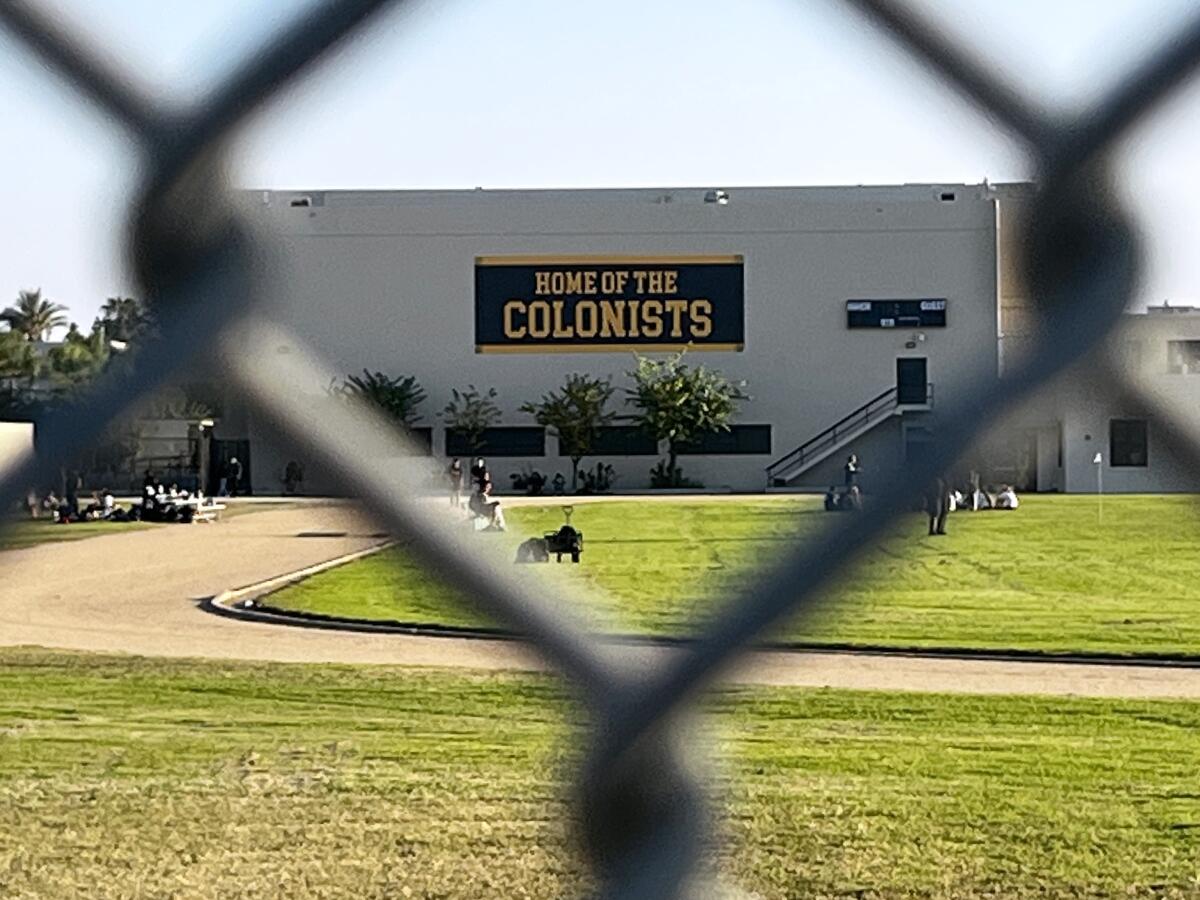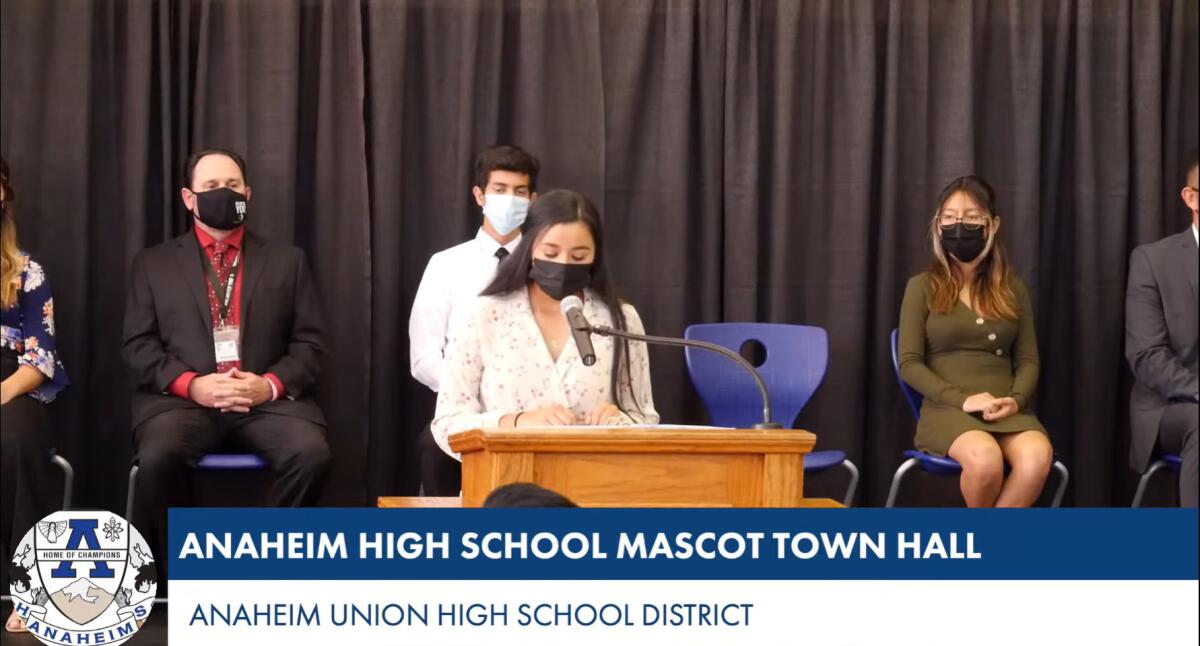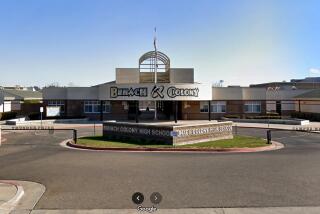Colonists for now: Anaheim High School students vote to keep name, mascot

A century ago, Anaheim High School students voted to become known as the home of the Colonists. A hundred years to the day, the nickname came before another vote amid petitions and protests by some in the community to replace what they see as an âinsensitiveâ moniker given the schoolâs supermajority Latino student population.
As it turns out, many of those students want to keep the âColonistsâ name â and even the mascot too.
The results of the Nov. 9 vote were revealed during a Wednesday town hall ahead of a scheduled Anaheim Union High School District Board of Trustees meeting that will address the studentsâ recommendation next month.
âAs a school district, we felt that this was a great opportunity for students to partake in a civic engagement project that is relevant to them and unleashes their student voice,â said Dr. Jared Fried, the districtâs assistant superintendent. âStudent voice and civic engagement are important key drivers that allow us to prepare our students to become life ready.â
A year ago, an online petition pushed by two Anaheim High School alumni began collecting thousands of signatures calling for the name and mascot change.
âWe cannot keep this mascot as it is a constant reminder of the trauma natives endured at the hands of colonizers,â wrote Laura Luevano. âOur ancestors did not experience cultural genocide, assimilation and exploitation for us to embrace this racist symbol.â
Before the town hall, protesters also rallied against the mascot outside of the school .
Jâamie Rubio, an author and historical journalist, started a competing online petition that gathered a few thousand fewer signatures. It called for the school to keep its nickname and mascot in the âonce a Colonist, always a Colonistâ spirit.
âThe term âColonistâ has always represented the early settlers who founded the âMother Colonyâ of Anaheim,â she argued in the petition.
According to âThe German Settlement at Anaheim,â by Jean Paule, immigrant Germans purchased land from Juan Pacifico Ontiveros in 1857 and established a winemaking colony that became Anaheim. By 1884, Mexican, Chinese and Indigenous labor in the vineyards had helped transform Anaheim into the largest wine-producing community in California at the time until a crop disease crippled its fortunes.
To this day, the residential âAnaheim Colonyâ neighborhood near the school is one of four such historic districts in the city and pays homage to the heritage.
âI am very happy that common sense prevailed today,â Rubio said of the vote. âThe student body at Anaheim High has proven today that school spirit is alive and well, and that they know the true history behind the Colonist name is not one that is offensive, or racist, as a small group has tried to claim. Instead it is a symbol of the founders of Anaheim who came to the area from a foreign land and literally built something out of nothing.â
The school was established in 1898.
Before the vote, Anaheim High School students considered all the issues at hand during a five-day lesson focused on whether to keep, rebrand or replace the nickname and mascot. The project took place during social studies and English courses.

Three students at the town hall spoke on behalf of each position.
âWe learned that German immigrants wanted to establish a colony in Southern California to grow grapes,â said Daniel Escobar, a junior. âModern-day Anaheim ended up being the place they settled and founded. Because Anaheim was founded as a colony, itâs appropriate to call us Colonists.â
Escobar stated that the blunderbuss-bearing mascot has been misinterpreted as a colonizer responsible for the slaughter of Native Americans.
Brianna Gurrola, asenior, favored a compromise solution by keeping the name but scrapping the mascot to avoid any such confusion.
âThe current Colonist imagery does not look anything like the colonists that settled Anaheim,â Gurrola said. âInstead, the images used throughout our schoolâs history look like the pilgrims or American colonists that founded the United States. By removing the weapon from our logo and bringing it more in line with our cityâs history, we will show the true meaning of a Colonist.â
Favoring all-around changes to her high schoolâs identity, Anahi Rico spoke last during the town hall.
âMany may argue that the original Anaheim colonists, after which our school was named, had done nothing wrong, that we were only named the Colonists because of the colony that they had peacefully settled, and that the definition of a colonist is a settler in or an inhabitant of a colony,â said Rico, a junior. âBut that definition is no longer valid when you take everything in history into account.â
She also argued that being a Colonist didnât convey school spirit and only served as a glorification of genocide.

Brandi Hoxworth, Anaheim High Schoolâs ASB president, presented the vote after the speakers were finished. The schoolâs 2,400 students had the opportunity to weigh in.
Forty-one percent voted to keep the name and mascot, 34% voted to keep the name but rebrand the mascot, and 25% voted to scrap both the name and the mascot.
âWeâre upset, obviously, with the result but more than anything with the process itself,â said Ivette Xochiyotl, an activist who advocated for the name change. âThe way that the school approached the situation was completely wrong.â
Xochiyotl said the educational materials surrounding the vote made no mention of the Indigenous people known as the Tongva. The activist group she belongs to plans to speak out at future school board meetings.
Ruben Calleros, the schoolâs assistant principal, touted the vote as an exercise in democracy and civility.
âThe students at Anaheim High School voiced their opinions through a school-wide vote and sent individual student letters representing multiple perspectives to the Board of Trustees,â he said at the close of the town hall. âUltimately, the Board of Trustees will decide whether or not to take action with these recommendations in mind.â
More to Read
Sign up for Essential California
The most important California stories and recommendations in your inbox every morning.
You may occasionally receive promotional content from the Los Angeles Times.











